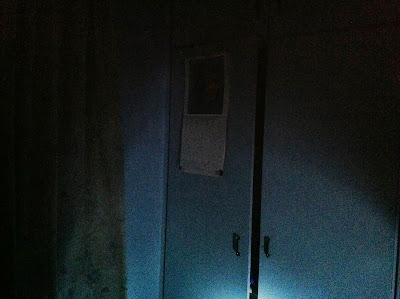Until last month, I've never read a Vonnegut. Yes, I've heard about how awesome Slaughterhouse-Five is, and that Cat's Cradle is one of the novels that everyone should read. I've heard people say that Vonnegut is this, and Vonnegut is that, and that he's an awesome writer, etc. etc. All right, enough already. So last month, I read my first Vonnegut—The Sirens of Titan. And boy oh boy is it good!
First, The Sirens of Titan is one of those novels that somehow defy classification. It does have space- and time-travel, so it must be science fiction. But the science doesn't really do much in the story. It doesn't propel the story in any way, it doesn't provide a comparison with our existing technologies, and it doesn't really showcase alien sciences. It must be satire or black humor then, as Vonnegut seems to make fun of religion, free will, our existing ideologies, and even the military.
In the end though, one asks: "Should we be all concerned with its genre?" No. Because The Sirens of Titan is defined by its story, and its story is one helluva ride in our solar system. The story moves from Earth, to Mars, to the moon, to Mercury, and finally to Titan, one of the moons of Saturn. One is unwise if he or she holds back on the suspension of disbelief. Like most readers who enjoyed the novel I presume, it's better to just enjoy the ride. Vonnegut isn't concerned with the technicalities of space travel; his characters just move fluidly from one world to the next.
Actually, I wouldn't have read The Sirens of Titan if it weren't the September book in the book club. After reading it though, I had no idea that I would be reading 2 more Vonneguts within the same day. That's how talented a writer Vonnegut is. Yes, we lost him in 2007, but thankfully, he was somehow prolific so there are still more novels of his that I would be reading. Woot woot!
The book club discussion was a blast though. As always, it was great to hear differing opinions about a book. The Sirens of Titan is the kind of book that's so ripe for discussion. I had fun reading it, so when asked for my rating, I gave it a 3 out of 5. I know, if I liked it that much, why the 3? Well, it's the shaggy dog that got to me. Vonnegut, you sly bastard—all civilization as we know it existed just to transmit that simple message! Still, I love the fact that Vonnegut was taking his reader for a "ride."
Here are some pics taken by R. during the discussion. Click on each one to enlarge.
First, The Sirens of Titan is one of those novels that somehow defy classification. It does have space- and time-travel, so it must be science fiction. But the science doesn't really do much in the story. It doesn't propel the story in any way, it doesn't provide a comparison with our existing technologies, and it doesn't really showcase alien sciences. It must be satire or black humor then, as Vonnegut seems to make fun of religion, free will, our existing ideologies, and even the military.
In the end though, one asks: "Should we be all concerned with its genre?" No. Because The Sirens of Titan is defined by its story, and its story is one helluva ride in our solar system. The story moves from Earth, to Mars, to the moon, to Mercury, and finally to Titan, one of the moons of Saturn. One is unwise if he or she holds back on the suspension of disbelief. Like most readers who enjoyed the novel I presume, it's better to just enjoy the ride. Vonnegut isn't concerned with the technicalities of space travel; his characters just move fluidly from one world to the next.
Actually, I wouldn't have read The Sirens of Titan if it weren't the September book in the book club. After reading it though, I had no idea that I would be reading 2 more Vonneguts within the same day. That's how talented a writer Vonnegut is. Yes, we lost him in 2007, but thankfully, he was somehow prolific so there are still more novels of his that I would be reading. Woot woot!
The book club discussion was a blast though. As always, it was great to hear differing opinions about a book. The Sirens of Titan is the kind of book that's so ripe for discussion. I had fun reading it, so when asked for my rating, I gave it a 3 out of 5. I know, if I liked it that much, why the 3? Well, it's the shaggy dog that got to me. Vonnegut, you sly bastard—all civilization as we know it existed just to transmit that simple message! Still, I love the fact that Vonnegut was taking his reader for a "ride."
Here are some pics taken by R. during the discussion. Click on each one to enlarge.
 |
| The discussion venue was at this aptly themed restaurant. It was literally filled with SF and fantasy stuff. |
 |
| I love the candy colors of my edition. I got my copy from Kinokuniya in Singapore. The lengths I go through just to get a book! |
 |
| Prior to the discussion, I wrote some notes. Somehow, I ended up writing 4 pages. Oh, the humanity! |
 |
| Another thing I love about the Sci-Fi Cafe is that they have books. And the books are guarded by R2-D2 no less. |
 |
| R. couldn't get enough of the Nimbus 2000. Allons-y! Oops, wrong geek reference. |
 |
| Joko, the moderator With Mike's Vonnegut finger puppet I want! I want! I want! |
 |
| I was seated next to the gorgeous Anne. Let me direct your eyes for a moment to what I'm wearing. It has a Frankenstein owl! Thanks R. for the shirt! |
 |
| I grew up on Star Wars, so I geek out whenever Star Wars is mentioned. I would love to have these spacecraft hanging in my room. |
 |
| Sci-Fi Cafe has a corner filled with costumes that customers can use for photo ops. Here's Marie with Spock (elven?) ears and wig. Live long and prosper! |
 |
| It was a lively discussion indeed. We're a very opinionated lot, and discussions can last for several hours. Here's Mike saying something, which I couldn't remember now of course. |
 |
| Of course, there are times when I completely tune out. Has been happening more frequently I'm afraid. I travel along the chrono-synclastic infundibulum. |
 |
| The Flippers Look at all the toys in the background! And that's not even half of what's in the store! Some of us died. |






















